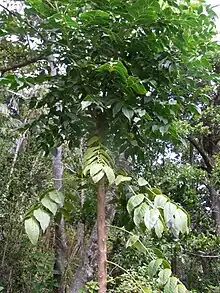| Polyscias cissodendron | |
|---|---|
 | |
| Scientific classification | |
| Kingdom: | Plantae |
| Clade: | Tracheophytes |
| Clade: | Angiosperms |
| Clade: | Eudicots |
| Clade: | Asterids |
| Order: | Apiales |
| Family: | Araliaceae |
| Genus: | Polyscias |
| Species: | P. cissodendron |
| Binomial name | |
| Polyscias cissodendron | |
Polyscias cissodendron, commonly known as the island pine, is a species of tree in the family Araliaceae. It is native to New Caledonia and Vanuatu in Melanesia, as well as to Australia’s subtropical Lord Howe Island in the Tasman Sea. The specific epithet is derived from the Greek kissos (“ivy”) and dendron (“tree”). On Lord Howe it occurs in sheltered lowland forest.[1]
Description
The tree grows to 12 m, sometimes more, in height. Its imparipinnate leaves are 10–35 cm long. It flowers from mid September to late November; producing paniculate, terminal inflorescences of small yellow flowers. The purple-maroon fruits are bluntly ribbed, laterally compressed and spheroidal, 3.5–4.5 mm long.[1]
References
- 1 2 3 "Polyscias cissodendron". Flora of Australia Online: Data derived from Flora of Australia Volume 49 (1994). Australian Biological Resources Study (ABRS). Retrieved 2014-01-23.
This article is issued from Wikipedia. The text is licensed under Creative Commons - Attribution - Sharealike. Additional terms may apply for the media files.